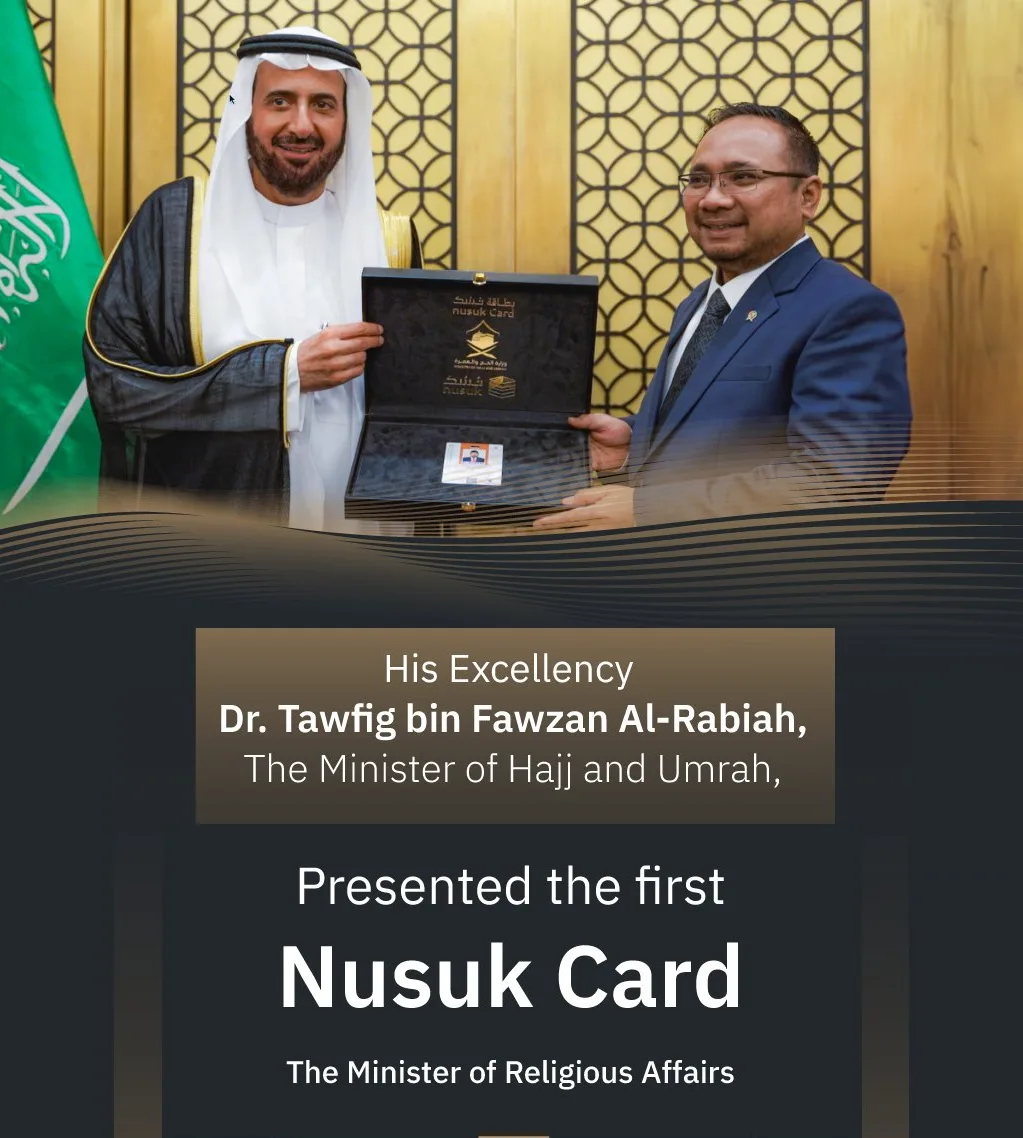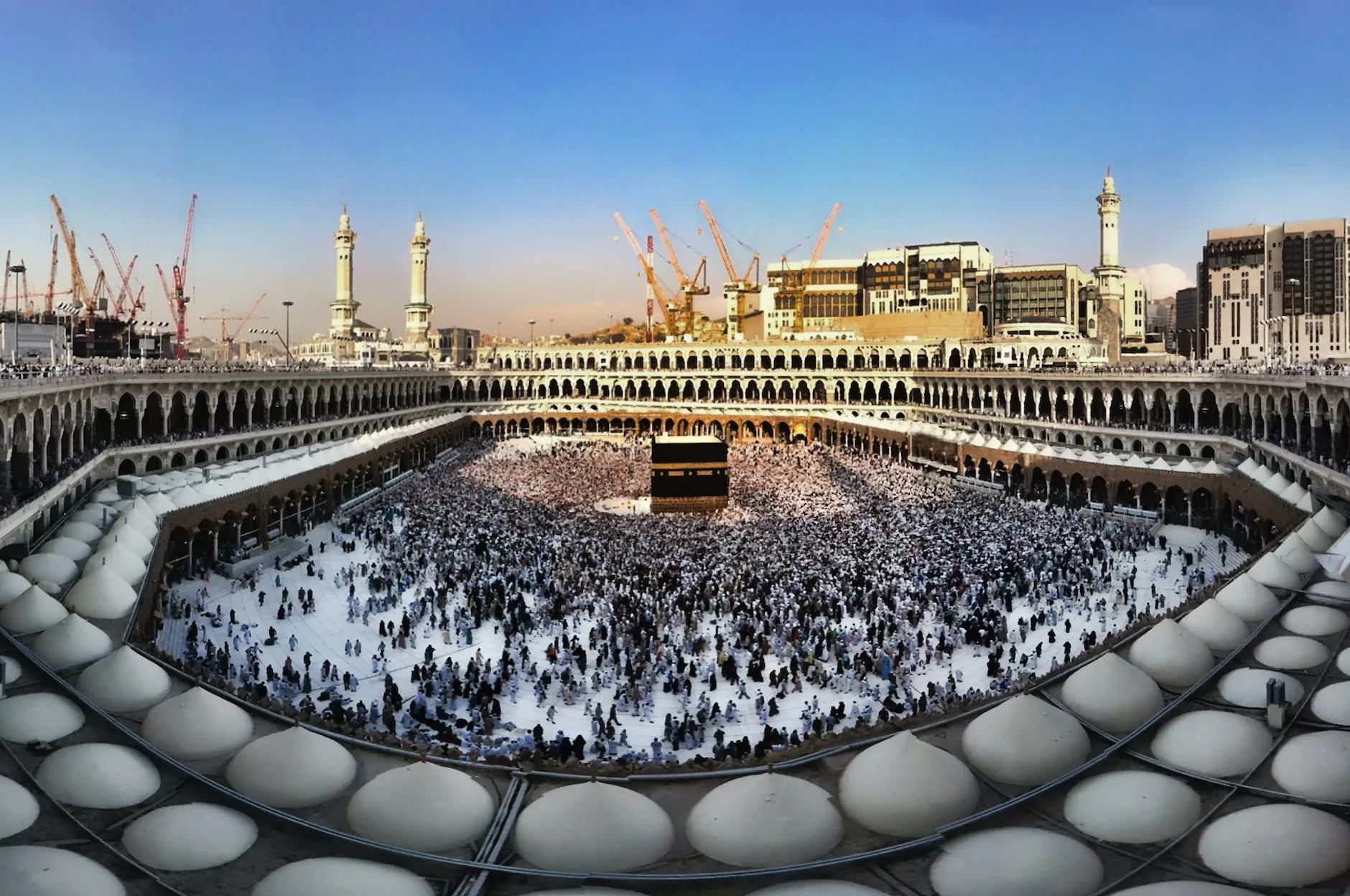Saudi Arabia Identify Illegal Hajj Pilgrims By Nusuk Card; Introduces New Tag System for Hajj 2024

First batch of Hajj Nusuk Cards presented to Indonesians
Saudi Arabia Stricter Against Illegal Haji
With less than two weeks before the first groups of overseas Muslims come for the Hajj pilgrimage, Saudi Arabia is getting stricter against people who try to make the pilgrimage without permission. The Saudi Ministry of Hajj made a special tag that legal pilgrims must have to go to the holy sites during Hajj. This tag is meant to make sure that only those allowed to go are there, keeping the pilgrimage safe and organized.
About Nusuk Card:
Your Key to Accessing Holy Sites in Makkah
The Nusuk Card, whether in digital or physical form, serves as a vital information repository necessary for pilgrims to explore the sacred sites of Makkah.
This card streamlines the process for authorities to identify and authenticate pilgrims, effectively preventing unauthorized access to revered locations.
Here’s how you can obtain it:
- For international pilgrims: Obtainable from Haj offices subsequent to visa issuance.
- For domestic pilgrims: Distributed by designated service providers upon acquiring a permit.
Additionally, the digital variant can be accessed through Saudi applications—Nusuk and Tawakklana.
Nusuk Card For Haji
The Saudi Minister of Hajj, Tawfik Al Rabiah, introduced the Nusuk Card in Indonesia recently. This card helps in making the pilgrimage process smoother and safer. The first batch of these cards was given to the Indonesian Hajj mission, starting off this new system.
As the Hajj pilgrimage draws near, Saudi Arabia is working hard to make sure everything goes well for all pilgrims. By using tools like the Nusuk Card, they hope to keep the pilgrimage meaningful and secure for everyone involved, giving them a memorable experience.
The Nusuk Card, including its digital counterpart, holds detailed information about each pilgrim, serving as their essential access pass to the sacred sites within and around Mecca, Saudi Arabia.
Overseas pilgrims will receive the card from their respective Hajj offices upon obtaining pilgrimage visas, while domestic pilgrims will obtain it from designated service providers after acquiring Hajj permits.
Designated by the Ministry of Hajj, the Nusuk Card is an official document intended to distinguish legitimate pilgrims from others at the holy sites. Its digital version can be accessed through Saudi apps Nusuk and Tawakklana.
Recently, Saudi Arabia warned Muslims planning to undertake the Hajj pilgrimage about fraudulent campaigns and websites, emphasizing the importance of utilizing authorized channels.
The Ministry of Hajj emphasized that relying on official channels ensures pilgrims’ access to the pilgrimage and safeguards their rights throughout the sacred journey.
Nusk platform
Furthermore, the ministry stressed that all pilgrims must acquire a Hajj permit through the Nusk platform. This announcement followed a statement by the Council of Senior Scholars, Saudi Arabia’s highest Islamic authority, which highlighted that performing Hajj without an official permit is considered sinful.
In February, Saudi Arabia introduced an e-registration system for its citizens and Muslim expatriates planning to undertake the Hajj pilgrimage scheduled for June this year. Last year witnessed a significant turnout of 1.8 million Muslims from various corners of the globe, signaling a return to pre-pandemic levels of participation.
For the forthcoming pilgrimage, Saudi Arabia has adopted a novel approach for accommodating overseas pilgrims. Instead of assigning specific quotas to countries, the allocation of pilgrimage slots will be contingent upon the finalization of contracts, streamlining the logistical process.
This revised method is geared towards streamlining the preparations for the Hajj pilgrimage, a sacred obligation incumbent upon financially and physically capable Muslims to fulfill at least once in their lifetime.
Saudi Arabia’s proactive measures underscore its commitment to ensuring a smooth and efficient Hajj experience, reinforcing its status as the custodian of Islam’s holiest sites.
In short, Saudi Arabia is making sure the Hajj pilgrimage is safe and organized. They’re using a special card called the Nusuk Card to identify real pilgrims. They’re also warning people about fake websites. Their goal is to make the pilgrimage easy and secure for everyone involved.
Updated Requirements for Performing Hajj in 2024: Ensuring Health and Safety of Pilgrims
In 2024, Saudi Arabia has introduced updated guidelines for the performance of Hajj, incorporating various new prerequisites to safeguard the well-being and security of pilgrims.
The Ministries of Hajj and Umrah, in conjunction with the Ministry of Health, have stipulated that all pilgrims must secure a Hajj permit via the Nusk platform, a crucial step to authenticate their pilgrimage. Additionally, mandatory registration on the Sehaty app is required to confirm the completion of necessary vaccinations.
Here are the key requirements:
- Residents residing within Saudi Arabia must have received the COVID-19, influenza, and meningitis vaccines within the past five years.
- International pilgrims are mandated to have received the Neisseria meningitidis vaccine at least 10 days but no more than five years before their arrival, substantiated by a certificate from their home country. They must also be vaccinated against polio.
- General conditions applicable to all pilgrims include possessing a valid passport until at least the end of Dhu Al Hijjah 1445 (June 7, 2024), being a minimum of 12 years old, and having received vaccinations against COVID-19, seasonal flu, and meningitis. Additionally, a health certification confirming the absence of any infectious diseases is required.
This announcement follows a recent declaration by the Council of Senior Scholars, underlining that undertaking Hajj without an official permit is deemed sinful. These measures are aimed at facilitating the smooth execution of Hajj rituals and improving the quality of services provided to pilgrims, thereby ensuring a safe and spiritually enriching experience for all participants.



